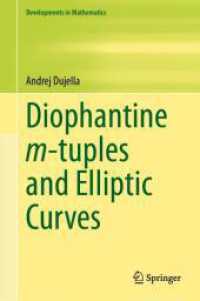- ホーム
- > 洋書
- > 英文書
- > Cinema / Film
Full Description
All countries and nations are deeply affected by their neighbours and every national cinema reflects this relationship. This book explores how postcolonial approaches can 'frame' the neighbours of people living in Eastern Europe. It elucidates how the region has evolved from being a communist extension of the Soviet Union to becoming integrated into neoliberal capitalism. Drawing on classical studies of post-coloniality by Edward Said, Gayatri C. Spivak and Homi K. Bhabha, as well as the works of theorists and historians like Janusz Korek and Jaak Kangilaski, who specialise in the Eastern European variant of postcolonialism, the book demonstrates particular sensitivity to the question of genre in investigating how neighbours fit into and shape melodramas and thrillers, heritage and war films. Contributors explore a wide range of films in relation to territory, from the steppes of the East to reunified Berlin and to Albania on the Adriatic Sea and from the streets of Tallinn to the hill slopes of Transylvania.
Individual chapters situate in a new context the movies of internationally celebrated filmmakers, such as Roman Polanski, Agnieszka Holland, Nikita Mikhalkov and Jan Hrebejk, as well as introducing films by locally renowned directors, such as Wladyslaw Pasikowski, Arsen Anton Ostojic' and Leida Laius.
Contents
Introduction: Postcolonial Theory and the Postcommunist World
Ewa Mazierska, Lars Kristensen, Eva Näripea
'If Your Car Is Stolen, It Will Soon Be in Poland': Criminal Representations of Poland and the Poles in German Fictional Film of the 1990s
Kristin Kopp
Neighbours (almost) Like Us: Representation of Germans, Germannness and Germany in Polish Communist and Postcommunist Cinema
Ewa Mazierska
'I'm at Home Here': Sudeten Germans in Czech Postcommunist Cinema
Petra Hanáková
Jánošík: The Cross-Border Hero
Peter Hames
From Nationalism to Rapprochement? Hungary and Romania Onscreen
John Cunningham
Postcolonial Fantasies. Imagining the Balkans: The Polish Popular Cinema of W?adys?aw Pasikowski
El?bieta Ostrowska
The Distant among Us: Kolonel Bunker (1998) in a Postcolonial Context
Bruce Williams
New Neighbours, Old Habits, and Nobody's Children: Croatia in the Face of Old Yugoslavia
Vlastimir Sudar
'Narcissism of Minor Differences'? Problems of 'Mapping' the Neighbour in Post-Yugoslav Serbian Cinema
Spela Zajec
The 'Near-Abroad' Neighbour in Nikita Mikhalkov's Urga (1991)
Lars Kristensen
Of Nazis, Barons and Bolsheviks: Envisioning the Other in Latvian Cinema
Maruta Z. Vitols
The Women Who Weren't There: Russians in Late Soviet Estonian Cinema
Eva Näripea
Bibliography
Index






